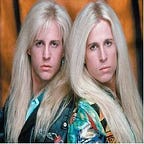The Washington Redskins, Daniel Snyder And Long Duk Dong
by Andy Kamenetzky
The most memorable character from the 1984 classic, “Sixteen Candles”, may not be Samantha, Molly Ringwald’s lead role. It may not be Jake Ryan, the dreamy object of her affection. It may not even be “Geek,” who helped launch Anthony Michael Hall’s career.
The most memorable and even beloved character might actually be Long Duk Dong, an Asian exchange student living with Samantha’s lily-white grandparents. The character is a blatant stereotype, and I occasionally cringe a bit watching his scenes. Long Duk Dong would never fly in 2014, nor should he.
But full disclosure, I do still laugh while he’s onscreen, and I don’t beat myself up over laughing, because I understand the reaction.
I laugh because the movie evokes memories of life as a kid in the 80s. I laugh because John Hughes and Brat Pack movies hold a special place in my heart, and “Sixteen Candles” is among the favorites. I laugh because I believe Long Duk Dong was invented from broad, lazy humor, which may not be “fine,” but isn’t the same thing as true mean-spiritedness. (We’re not talking about Mickey Rooney’s character in “Breakfast at Tiffany’s,” repulsive by any standard.) And I laugh because Gedde Watanabe is terrific, which goes a long way towards softening the crudeness.
I can separate being introduced to Long Duk Dong as a teenager versus what I know as an adult. I can remain amused while knowing it’s for the best such characters are increasingly rare. Long Duk Dong may have a place in my heart, but I also know his existence can’t be “defended,” so I wouldn’t bother trying.
Just like you can’t defend a nickname like the Washington “Redskins,” but that clearly won’t stop team owner Dan Snyder.
D.C.’s most controversial sports figure sat down with ESPN for an upcoming episode of “Outside The Lines” to discuss yet again his unwillingness to change a name considered by many (if not most) to be, at best, inappropriate and, at worst, a racial slur. Snyder offered his usual string of explanations that don’t pass the smell test when pitted against common sense, much less a perfunctory five minutes of historical research.
But I’m not here to rehash the myriad of well-worn reasons why the name should change. I’m far more curious about the mindset of Snyder and others standing in the way. Why is it so important to these people that the name never change, come hell or high water?
Is this a matter of truly believing, against a boatload of reasons to the contrary, “Redskins” really isn’t offensive on any level? Is it a matter of not wanting to cave, in their minds, to a P.C. culture wildly out of control? Or is the issue perhaps a concern that conceding inappropriateness poorly reflects on them?
I’ve often wondered if those holding fast to “Redskins” are motivated in large part by not wanting to think of themselves as having been at some point subconsciously racist or intolerant. Conceding the name’s history could taint memories from childhood (when Snyder himself, among countless others, first developed love for the team) or prompt an uncomfortable examination of passion and priorities. For Redskins fans, second-guessing the name could become the equivalent of second-guessing themselves, never a pleasant task.
For what it’s worth, if that’s the sticking point, the fear is completely unwarranted.
Those who’ve embraced the “Redskins” nickname are by no means implicitly racist. They’re by no means implicitly bad people. They’re simply a product of an environment shaped and dictated first and foremost by Caucasian sensibilities, where minorities in general were something of an afterthought, with Native Americans the clubhouse leader for “overlooked.” I don’t necessarily blame somebody in my age range (much less older) for going decades without giving the matter much thought. By and large, nobody did, which allowed a glaringly tasteless moniker to survive. As a teenager, I was intellectually and emotionally capable of recognizing the absurdity of an NFL team being named after a derogatory term I heard in old Westerns. The math ain’t hard. But I was never prompted to actually care, because our collective consciousness wasn’t the same.
Today, not so much. “Post-racial America” may be fictitious narrative, but race and racial sensitivity are nonetheless viewed differently in 2014 than 40 years ago, much less 1933, when the then-Boston Braves became known as the Boston Redskins. Society individually and collectively evolves, and this can be recognized without indicting the Redskins fanbase, nor the memories collected along the way.
But memories, however cherished, aren’t immune to context, the principle to understanding past, present and future. Context allows me to smile at Long Duk Dong, but object to a modern incarnation. Context also explains why it was easy for so long to jam heads in the sand regarding “Redskins,” but why remaining ostriches no longer flies.
